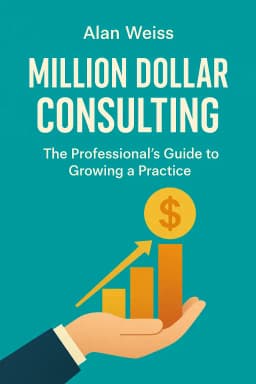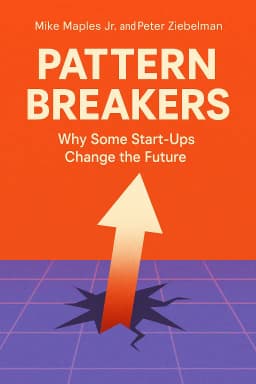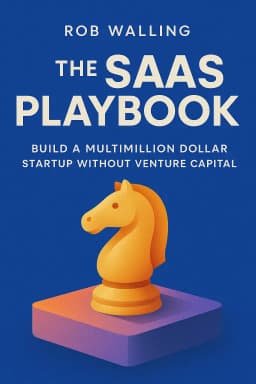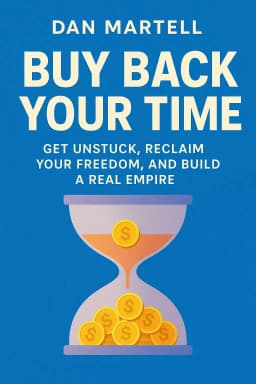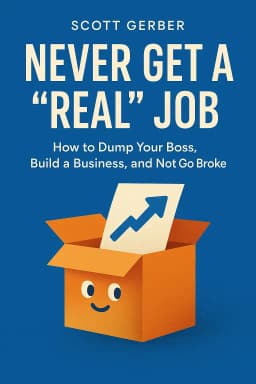
The 'You Are Special' Lie
How to Dump Your Boss, Build a Business, and Not Go Broke
Golden Hook & Introduction
SECTION
Mark: The most dangerous piece of advice you ever received might be the one you heard most as a a kid: ‘You are special.’ Today, we're exploring a book that argues this single idea is the biggest obstacle to your success. Michelle: Wow, that's a spicy take to start with. It feels like a direct attack on a whole generation's participation trophies. But honestly, it’s also incredibly intriguing. You hear 'you're special' your whole life, and you never stop to think, what if that's actually holding me back? Mark: That's the central, explosive premise of Scott Gerber's 2010 book, Never Get a “Real” Job. And he pulls no punches. Michelle: And the timing of this book is so key. Gerber wrote this right in the shadow of the 2008 financial crisis, when an entire generation was graduating into a world where the promise of a 'real job' had completely evaporated. It reads less like a self-help book and more like a survival guide. Mark: Exactly. He's not some theorist writing from an ivory tower; he's a serial entrepreneur who founded the Young Entrepreneur Council. This book is written from the trenches, for people in the trenches. His core argument is that the world has changed, and the mindset we were raised with is dangerously out of date. Michelle: So it’s a reality check, served cold. I’m ready for it. Where does he begin this grand teardown of our childhood dreams?
The Brutal Breakdown: Shattering the Myth of 'Special'
SECTION
Mark: He starts by going right for the jugular: the entitlement that comes from being told you're a unique genius your whole life. He argues this "coddling culture" creates a generation that expects success to just... happen. He even uses his own life as the first and most embarrassing case study. Michelle: Oh, I love when authors do that. It shows they're not just preaching. What was his big delusion? Mark: In high school, he fell in love with filmmaking and immediately decided he was destined to be the next Spielberg. He even nicknamed himself 'Spielgerber.' He imagined directing huge blockbusters right out of college, becoming a millionaire, all without the tedious process of, you know, actually working his way up. Michelle: 'Spielgerber.' That is both amazing and deeply cringey. I think we all have a version of that in our past, that secret, grandiose identity. Mark: We do. And he connected with some alumni who were actually in the film industry, but they were just production assistants, doing grunt work. He looked down on them, thinking, "That won't be me. I'm different. I'm special." He was convinced he'd skip all the hard parts. Michelle: Okay, but isn't a little bit of that self-belief necessary for big dreams? Where do you draw the line between healthy ambition and the toxic entitlement Gerber is talking about? Mark: That's the perfect question. Gerber's answer is action. The line is where your belief in your own brilliance is not matched by your willingness to do the unglamorous work. It’s the difference between saying you’re a winner and actually putting points on the board. He has a whole section titled, "Claiming to Be a Winner Does Not Make You One." Michelle: That feels very direct. So this 'Spielgerber' mentality leads to a rude awakening. What does that look like in the real world, after college? Mark: It looks like the story he calls "Dude, Where’s My Dream Job?" A recent graduate, armed with a decent GPA and an inflated sense of self, enters the job market expecting to be handed their perfect career on a silver platter. They send out a few applications for top-tier jobs and then wait for the flood of offers. Michelle: A flood that never comes, I'm guessing. Mark: A trickle, at best. And when they do get an interview, they fail to impress because they talk about their 'potential' instead of demonstrating actual, practical skills. They come off as entitled, not brilliant. The resolution is always the same: they face rejection after rejection until they're forced to take a job they feel is beneath them, just to pay the bills. Michelle: That is a painfully familiar story. It’s the gap between what college promises and what the real world demands. You're told you're brilliant, but no one told you that brilliance without proof is worthless. Mark: Precisely. And Gerber’s most cutting quote on this is simply, "Everyone poops. Yours isn’t special." It’s crude, but it’s a perfect metaphor. We all have ideas, we all have potential. But the world doesn't care about your potential. It only cares about what you produce. It’s a brutal but necessary foundation to lay before you can even think about building something for yourself. Michelle: Right, because if you start a business with that 'Spielgerber' mindset, you’re doomed. You'll think your idea is so brilliant it doesn't need a real business model, or that customers should just flock to you because you're a genius. Mark: You've hit on the exact transition point. That mindset is the number one reason startups fail. And Gerber has a story for that too.
The Gritty Build-Up: 'Shoestrapping' Your Way to Survival
SECTION
Michelle: Alright, so he's torn down our ego. It's a bit bleak. What does he want us to do? How do you build something from the ashes of your shattered specialness? Mark: You start by accepting another hard truth: your business is not the exception to any rule. To illustrate this, he tells the story of his first major failure, a multimedia agency he launched after college. It started as a simple, profitable entertainment production company. But he got ambitious. He saw a trend and decided to become a complex, one-stop-shop for everything. Michelle: The classic overreach. It sounds smart on paper, but I have a feeling it got messy. Mark: Incredibly messy. He calls it an "overcomplicated money pit." They hired a four-person team before they could afford them. They rented expensive office space to look impressive. A client didn't pay them, leaving them in debt. They lost a big project to a competitor who then subcontracted the work back to them for less money. It was a year-long cascade of failures. Michelle: Wow, that’s a masterclass in what not to do. So what’s the lesson he pulls from that wreckage? Mark: The lesson is the core of his practical advice: "Shoestrapping." The term is a play on bootstrapping, because, as he says, "the boot is too damn expensive." It’s about being radically frugal and resourceful. It means your number one, two, and three priorities are all cash flow. Michelle: So 'shoestrapping' is basically the business version of living on ramen noodles in college, but with a strategic plan? Mark: That’s a perfect analogy. It’s about making every single cent count. Don't rent an office; work from home. Don't hire employees; use freelancers or interns. Don't buy expensive software; find free or low-cost alternatives. He gives this great example of how to look like a million-dollar company on a tiny budget. Get a professional-looking website template for ten bucks a month. Get a vanity phone number. Create a sharp email signature. The perception of professionalism doesn't have to cost a fortune. Michelle: That’s actually really empowering. It lowers the barrier to entry. You don't need a huge venture capital investment to get started. You just need to be clever. But what about the actual business plan? I feel like that's where most people get stuck. Mark: Ah, and this is where Gerber drops another bomb. The title of Chapter 5 is "Business Plans Suck." Michelle: Oh, thank goodness. I thought you were going to say we need a 100-page document filled with five-year projections. That sounds so much more... doable. Mark: He argues that for a startup, a traditional business plan is a form of procrastination. You spend months perfecting a document that becomes obsolete the moment you actually talk to a customer. Instead, he proposes the "One-Paragraph Start-Up Plan." Michelle: Okay, I’m listening. What is that? Mark: It's a series of eight simple questions you have to answer. What is your business? What problem does it solve? Who is your target customer? Why are you the right person to do this? How will you reach customers? How will you make money? Who are your partners? What are your goals for the first year? That's it. Michelle: That’s brilliant. It forces you to have clarity. It’s not about impressing a bank; it’s about knowing what you’re actually doing. It’s a plan for action, not a plan for a bookshelf. Mark: Exactly. The whole point is to get you out of your head and into the market as quickly as possible. Because, as the title of another chapter says, "Those Phones Won’t Ring Themselves." The final piece of the puzzle is the relentless, unglamorous, and absolutely essential work of sales and marketing. You have to make people care.
Synthesis & Takeaways
SECTION
Michelle: So when you put it all together, the book isn't just anti-job. It's anti-fantasy. It's about trading the fantasy of being 'special' for the reality of being useful, resilient, and frankly, a bit of a hustler. Mark: Precisely. And that's why the message, despite its harshness, is ultimately empowering. Gerber's point is that real control, real freedom, doesn't come from a 'dream job' that someone else gives you. It comes from building something yourself, even if it's small and messy and terrifying at first. The fear shouldn't be of failure, but of a life lived in quiet regret. Michelle: He has that great quote at the end, right? It's from another entrepreneur, but it sums up the whole book. "Be afraid. Be very afraid. Be afraid to have never failed. Be afraid of living with regrets for the rest of your life." That one really sticks with you. Mark: It’s the perfect summary of the ethos. It reframes fear not as an obstacle, but as a compass. Fear of regret is the fuel. Michelle: It makes me think about how this book was received. It has pretty mixed reviews. Some people find it incredibly inspiring for all the reasons we've discussed. Others find the tone too aggressive and the advice too basic. I can see both sides. Mark: I think that's the sign of a book with a strong point of view. It's not trying to please everyone. It's a wake-up call, and some people don't want to be woken up that way. But for the person who needs that jolt, it can be life-changing. Michelle: So for anyone listening who feels stuck, maybe the one small action to take from this is to try Gerber's 'One-Paragraph Start-Up Plan.' Just answer those eight questions for an idea you've been kicking around. It's not a commitment; it's an exercise in clarity. Mark: I love that. It’s a five-minute step away from fantasy and toward reality. Michelle: And we'd love to hear what you think. Does this tough-love approach to entrepreneurship resonate with you, or does it feel too cynical in today's world? Let us know your thoughts. We're always curious to hear how these ideas land with our community. Mark: This is Aibrary, signing off.

